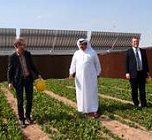The first cucumbers produced in the Sahara desert using seawater and solar power were served up to participants at UN Climate Negotiations in Doha.
Cucumber may be a warm-season vegetable, but the Sahara desert is a rather extreme environment even for this sun loving plant as it is also quite thirsty.
The Sahara Forest Project has combined saltwater-cooled greenhouses, concentrated solar power (CSP), solar panels and desalination technologies to produce the crop from what is otherwise barren land. Salt created from the process is on-sold to third parties. Key to the project is not so much any individual technology, but how they work together.
By using seawater to provide evaporative cooling and humidification, crop water requirements are minimized and yields maximized – and with a minimal carbon footprint. Cutting down “food-miles”, that is, the distance food needs to be transported from the farm gate to consumer plate, also further reduces emissions.
Rather than being a we’re-doing-this-because-we-can sort of project; there is a pressing need to produce food in our deserts using brackish or sea water. To sustainably produce food, water and energy for a world population expected to reach 9 billion in 2050 will be no mean feat.
“Innovation is essential to address the global challenges. The Sahara Forest Project creates a new approach to the combined issues of food, energy, fresh water and climate change,” says Ole Jørgen Haslestad, CEO of Yara International ASA; a project partner.
The 1 hectare pilot facility in Qatar is also using the seawater to grow algae for biofuels.
Sahara Forest Project was presented at the official UN side event Feature Hour at COP18.
Closer to home, Sundrop Farms near Port Augusta in South Australia has also been successfully growing food in a desert environment and a planned expansion will see the facility able to produce 2.8 million kg of tomatoes and 1.2 million kg of peppers annually.












































